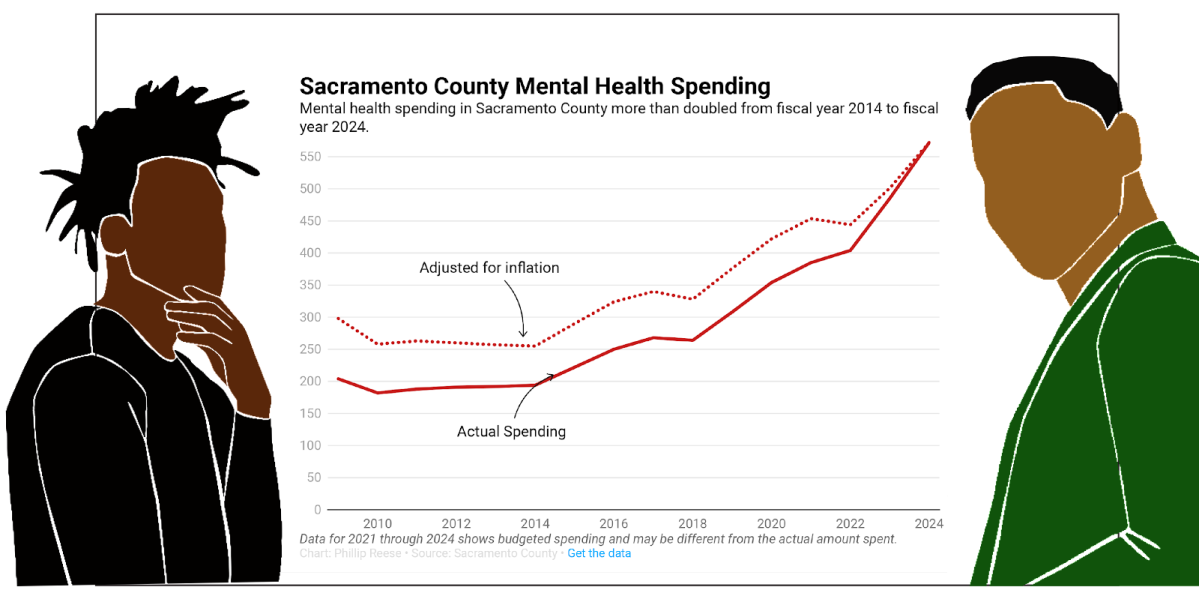Funding Shifts For Mental Health Spending
Deaths of Black Men Help Spur Change In Mental Health Focus
By GENOA BARROW February 23, 2024
As the coronavirus ravaged the community in 2020, Black leaders began to speak of having to battle a double pandemic – one that was killing people sight unseen and another that was very much in their faces: police violence rooted in racism and unequal treatment.
Supporting a declaration from the U.S. Centers for Disease Control and Prevention, the Sacramento County Board of Supervisors declared racism a public health crisis in 2021, promising to address generational inequalities. Three years later, local stakeholders say that vow has meant more focus – and funding – for mental health services and awareness efforts.
“I’ve been doing this work for 30-40 years now and I’ve been around long enough to see the ebb and flow,” says Paul Moore, the program services manager for ONTRACK Program Resources.
ONTRACK, led by grassroots organizer Madalynn Rucker, has a contract with Sacramento County and is a major provider of mental health services to the region’s Black community. The agency works with public and private organizations to offer assistance in improving leadership and workforce skills, programs and systems to serve diverse communities of color and ethnic services provided amongst professional work groups.
Its training includes teaching National Standards for Culturally and Linguistically Appropriate Services, or CLAS, a blueprint for individuals and health and health care organizations to implement culturally and linguistically appropriate services.
Moore recalls working in Oak Park in the 1990s, when leaders’ idea of helping was the Weed and Seed program, which saw a lot of Black men being arrested for drug offenses.
“‘Weed’ meaning arresting a lot of Black people, particularly Black men; and ‘seed’ meaning doing some things in the community – that was the promise of reducing crime and making our community safe,” Moore says. “And here we are 30 years later looking back to seeing that mass incarceration is wiping out the budget so we can’t do other programs and traumatizing huge portions of our community.”
Funding was scarce for mental health providers in the 1990s.
“Programs were scarce. Black-owned, Black-run nonprofits who address issues in our community, mental health, we weren’t getting funded. Now, there’s a lot more funding. It’s pretty slushy right now,” Moore says.
A disproportionate number of Sacramento County Behavioral Health Services’ clients identify as Black. Black clients made up approximately 23.2% of patients served by the county in 2022, while only 11% of the county’s population identifies as Black, the latest county data show. Data also shows that county mental health spending more than doubled from 2014 to 2024.

“I think particularly with the Black Lives Matter events that occurred here in Sacramento and nationwide, there is, as a result of that and other things, people working real hard for it, and there’s a lot more money,” Moore says.
“They started a health and racial equity unit since all that happened,” Rucker says. “I think we were the fourth in the country to actually declare racism as a public health crisis and they put money to it.”
“It’s a different atmosphere,” Moore says. “Even with county workers and executive folks who run these agencies, it’s all changed. The attitudes have changed and it’s stunning.”
The willingness to “sit at the table,” Moore says, and take things beyond the bureaucratic level makes all the difference.
His boss agrees.
“We’re talking to administrators that want to change the system,” Rucker says. “They finally get that the injustice is stemming from, is being maintained, because the systems are broken, and supporting it, literally supporting it.”
As part of its county contract, ONTRACK conducts mandatory cultural competency training for hundreds of county public health employees. The training is crucial, Moore says, as these employees, mostly non-Black, are gatekeepers who determine who gets into beneficial county mental health programs.
“Fewer Black men will be kicked out of these programs, I guarantee you that,” Moore says. “They’re going to be paying attention to how their assessments are done, from intake to when they exit programs. You can do things that could be changed that makes it more conducive for Black men to get through those programs successfully and be healthy. Those are the subtle changes that are occurring in Sacramento.”
Nationally, programs that focus on correcting historic discrimination and inequity are under attack by white conservatives. Florida groups have filed lawsuits to dismantle affirmative action programs and those that specifically focus on African American inclusion and achievement.
“There’s always pushback,” Moore says. “It’s that ebb and flow. We’ve got it [funding] now, we’ve got to hold on to it.”
Rucker says ONTRACK was initially charged with leading seven training sessions, but has now done 34. The contract has been extended three times so far, she adds.
“They’re really trying to bring resources and make this happen,” Rucker says. “I always emphasize that it’s a marathon. It is not a short run, this is not going to change a whole lot, but this was the way to do it short of total revolution. No one wants to see people dying in the streets.”
Finding and creating systems that work contribute positively to everyone, Rucker says.
“We’ll spend less money on having people homeless and in the streets, less money on people recycling through these treatment programs and not really getting better. It’s costly not to do these things and to not to treat people better. It’s costing people both physically and mentally, but also financially too. We could be putting that money into much better, healthier solutions to these problems.”
It’s all multi-leveled, Rucker says.
“Never underestimate how complex it is. No one’s going to have all the answers to anything, but it’s still about finding incrementally what pushes the needle and not just doing lip service.”
Data journalist and Sacramento State Professor Phillip Reese contributed to this article.